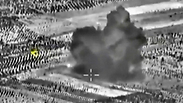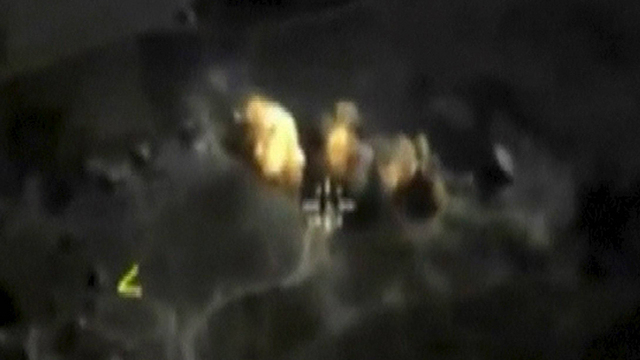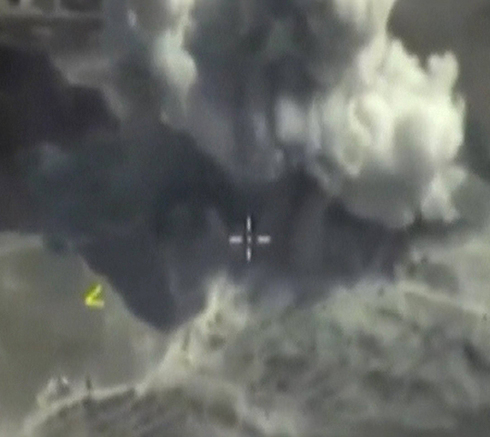
Russian army in Syria: A failure foretold
Analysis: Russia's previous military interventions have led to the death of thousands of civilians and its army has never defeated jihadist terror, yet it will do anything to help the Assad regime, as well as its own strategic and economic interests. How will the Russian adventure affect Israel?
At a certain stage, the ruler and regime are at risk of being toppled. The Russians bring in forces and directly intervene in the battles. Jihad organizations declare a holy war ("jihad") on the regime and the Russians, and thousands of Muslim volunteers from around the world join the war. Many countries, including Saudi Arabia and the Gulf states, help the jihadists.
Last month, a decision was made in the Kremlin to directly intervene in the war in Syria. Israel and Saudi Arabia are concerned, Hezbollah and Iran are satisfied. In Syria, the Sunni opposition organizations feel threatened and Bashar Assad's regime is encouraged.
Only about two years ago, opposition groups had hoped that the United States would act on its threats to attack the regime's army if Syrian President Assad fails to get rid of the mass destruction chemical weapons in his possession. Not only was the American attack canceled, but now Russia is intervening in favor of the regime.
Why is Russia intervening now? Do the Russians have a chance of solving the conflict where other countries have failed? And how will this intervention affect Israel?
Russia must not lose Syria
Russia has stood by the Assad regime since the unrest began in March 2011, by sending advisors and transferring weapons. Moscow's interests are strategic and economic: Russia is not interested in losing its only foothold in the Middle East, the port in the Syrian city of Tartus and the airport in the port city of Latakia.
The close relations between Russia and Syria began in the 1970s, when Russia saw Hafez al-Assad's regime as an alternative to Egypt, where the Russian advisors were expelled by President Anwar Sadat. After the discovery of gas fields off Israel's shores, the Russian presence received an economic aspect as well, as there is also a chance of finding gas and oil near the shores of Syria.
Russia's move to the front of the stage shows just how serious the Syrian regime's distress is. The Syrian army has failed to record a single achievement since the occupation of the old city of Hama in February 2014. The Assad regime's main ally, the Lebanese Hezbollah organization, recently failed in its attempt to gain control of the city of Zabadani near the Lebanese border.
In addition, the motivation among Hezbollah fighters to join the Assad regime has dropped significantly in the past few months in light of the stalemate in the battles and the number of casualties. In the height of their distress, the Alawites and Shi'ites turn to their patrons - Iran and Hezbollah.
Commentators in the Arab world believe that the Russians rushed to deploy their forces in Syria before the Iranians decide to do so. Nonetheless, Iran will take advantage of the Russian bombings to gain victories in Syria against organizations funded by Saudi Arabia, in order to compensate for the withdrawal of its Houthi allies in Yemen.
There is no doubt that the Russian decision to bring in forces at a time of a crisis in Ukraine and an internal economic distress points to the urgency of the matter. Does Vladimir Putin's adventure stand a chance?
A failure foretold
The history of world powers intervening in conflicts in the Middle East does not seem promising for the Russians: The Soviet Union failed in Afghanistan in the 1980s, and the Americans failed in Iraq in the 2000s. Israel's failure in Lebanon in the 1980s and the Assad regime's shameful pullout from Lebanon in 2005 can be added to the list.
These wars solved certain problems in the short run and created new monsters which have not been destroyed to this very day - Hezbollah, al-Qaeda and the Islamic State. Russia brought about the death of thousands of citizens and never defeated the jihadist terror, neither in Afghanistan in the 1980s nor against the Chechens in the 1990s, and it will probably fail in Syria as well.
Most commentators in the Sunni world distrust the Russian intervention. They say that the Russian weapons allowed Assad to control the Syrian people through intimidation and terror and take over Lebanon instead of trying to liberate the Golan Heights from Israel.
The commentators note the lack of a political horizon in the Russian move. According to them, the Russians are helping those who represent the Alawite minority (11 percent of the population) against the Sunni majority (80 percent of the population), and are helping a leader responsible for turning most of the country into ruins, for the death of more than 220,000 Syrians and for the fact that half of the country's residents have become refugees - all in order to survive in power.
Russia will sink in the Syrian mud
As the Russians land on their shores, the Alawites are returning to the situation of protégés leaning on a foreign power, just like during the French mandate in the 1930s and 1940s, thereby losing the little legitimacy they had left to control Syria.
The Russian position is against the Sunni majority. In other words, as far as the Arabs are concerned, Russia, like France in the past, is going against the Syrian Arab nationality. Even if the goal to fight ISIS is holy, Russia is positioning itself as an enemy of Sunni Islam by supporting Iran and Hezbollah.
In the first stage, the Russians will likely try to avoid the mistakes of the past and will only defend their interests in the northwestern coast, the Alawites' stronghold. But the rebels' progress will force to Russians to gradually enter the shaggy and swampy mud of the Syrian civil war.
Russia can’t afford to allow the rebels to take over the Syrian army's weapon arsenals (including hidden chemical weapons perhaps?) The rebels will try to hit Russian targets in order to get them entangled in an unwanted war and convince them to leave, which will lead to counter attacks. The Russian army's famous cruelty is the fuel lighting the Islamic fundamentalism. The traditional brutality of the Russian army will only create further hatred and give the jihadists legitimacy in the eyes of many Muslims in the world.
Syria's topography is more convenient than Afghanistan's, but it's still difficult for the Russian soldiers with the hot Syrian desert in the east and the mountainous areas in the west. The fighting in the cities will be carried out between ruins and in underground tunnels. The political conditions the Russians are entering are impossible - supporting an ethnic minority against the majority of the Syrian people.
The reality on the ground is pretty complex: Numerous factions of Islamic organizations, local militias of Christian minorities, militias of the Druze in the south and the Kurds in the north, uncoordinated defense militias and military divisions standing by the Damascus regime, Hezbollah cells and the Iranian Revolutionary Guards scattered in the areas controlled by Assad, and above all - the huge "Islamic State," extending from western Iraq to the Idlib district in Syria.
The airspace is quite difficult too: A density of too many planes in the air fighting the terror organizations. From the eastern side, the coalition planes of the US and its allies, and from the western side, the Syrian plans dropping barrel bombs and now Russian planes as well. And we have yet to mention the occasional Israel Air Force bombings of Syrian posts in response to the spillover of the fire into Israel.
In such a reality, there is a higher chance of accidents: Russian soldiers hitting their allies or American planes, or - Heaven forbid - Russian-provided air defense systems firing at Israeli planes.
The Israeli interest
There is no doubt that the Syrian army's breakup in the past few years has removed a significant threat on Israel's security from the northern arena. The balance in the battle between Sunni terror organizations and the Shi'ites is not leading to a victory or a defeat, but is wearing out both sides.
A Russian intervention, however, will violate the balance in the short run in favor of the Shi'ite axis and may have serious consequences. The Russians will arm the Syrian army, which may threaten Israel directly with advance weapons or indirectly by transferring these weapons to its ally Hezbollah.
Ousting Assad is the only way to create a coalition against the terror of ISIS and al-Qaeda's branch, the al-Nusra Front, together with Saudi Arabia and Turkey and European countries. A united Arab coalition with legitimacy from the Syrian people and the international community will be able to free Syria from the terror organizations. Such a coalition removed Saddam Hussein from Kuwait in 1990.
A Russian intervention is not a rescue but an invasion. It does not serve our region; it only serves Russia. It definitely does not bring us closer to stability and peace, but announces an escalation in the war.
The Russians will first of all destroy the remaining moderate rebels in order to only leave the crazy ISIS and al-Nusra ones in the opposition. That way, they will be able to whiten the regime and present Assad as a favorable option for Syria's future.
The Shi'ite axis will undoubtedly try to make the most of the Russian presence against Israel, against Saudi Arabia, against the Gulf states and in favor of deepening the Iranian imperialism in Syria, in Lebanon, in Iraq and in Yemen.
Dr. Yaron Friedman, Ynet's commentator on the Arab world, is a graduate of the Sorbonne. He teaches Arabic and lectures about Islam at the Technion, at Beit Hagefen and at the Galilee Academic College. His book, "The Nusayri Alawis: An Introduction to the Religion, History and Identity of the Leading Minority in Syria," was published in 2010 by Brill-Leiden.





















